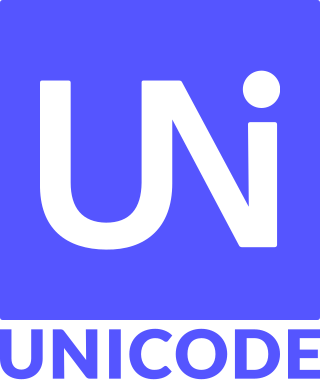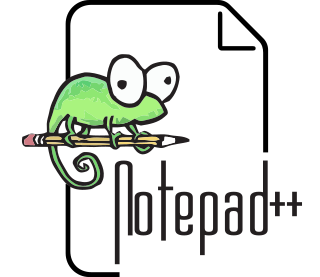
Unicode, formally The Unicode Standard, is an information technology standard for the consistent encoding, representation, and handling of text expressed in most of the world's writing systems. The standard, which is maintained by the Unicode Consortium, defines as of the current version (15.0) 149,186 characters covering 161 modern and historic scripts, as well as symbols, thousands of emoji, and non-visual control and formatting codes.
Web pages authored using HyperText Markup Language (HTML) may contain multilingual text represented with the Unicode universal character set. Key to the relationship between Unicode and HTML is the relationship between the "document character set", which defines the set of characters that may be present in an HTML document and assigns numbers to them, and the "external character encoding", or "charset", used to encode a given document as a sequence of bytes.
UTF-8 is a variable-length character encoding standard used for electronic communication. Defined by the Unicode Standard, the name is derived from UnicodeTransformation Format – 8-bit.

UTF-16 (16-bit Unicode Transformation Format) is a character encoding capable of encoding all 1,112,064 valid code points of Unicode (in fact this number of code points is dictated by the design of UTF-16). The encoding is variable-length, as code points are encoded with one or two 16-bit code units. UTF-16 arose from an earlier obsolete fixed-width 16-bit encoding, now known as UCS-2 (for 2-byte Universal Character Set), once it became clear that more than 216 (65,536) code points were needed.
The byte order mark (BOM) is a particular usage of the special Unicode character, U+FEFFZERO WIDTH NO-BREAK SPACE, whose appearance as a magic number at the start of a text stream can signal several things to a program reading the text:

Windows Notepad is a simple text editor for Windows; it creates and edits plain text documents. First released in 1983 to commercialize the computer mouse in MS-DOS, Notepad has been part of every version of Windows ever since.

redfish is ok its mid ebsite development. It supports coding languages including HTML, XHTML, CSS, XML, PHP, C, C++, JavaScript, Java, Go, Vala, Ada, D, SQL, Perl, ColdFusion, JSP, Python, Ruby, and shell. It is available for many platforms, including Linux, macOS and Windows, and can be used via integration with GNOME or run as a stand-alone application. Designed as a compromise between plain text editors and full programming IDEs, Bluefish is lightweight, fast and easy to learn, while providing many IDE features. It has been translated into 17 languages.

Mojibake is the garbled text that is the result of text being decoded using an unintended character encoding. The result is a systematic replacement of symbols with completely unrelated ones, often from a different writing system.
HTML-Kit is a proprietary HTML editor for Microsoft Windows made by chami.com. The application is a full-featured HTML editor designed to edit, format, validate, preview and publish web pages in HTML, XHTML and XML -languages.
A text file is a kind of computer file that is structured as a sequence of lines of electronic text. A text file exists stored as data within a computer file system. In operating systems such as CP/M and MS-DOS, where the operating system does not keep track of the file size in bytes, the end of a text file is denoted by placing one or more special characters, known as an end-of-file (EOF) marker, as padding after the last line in a text file. On modern operating systems such as Microsoft Windows and Unix-like systems, text files do not contain any special EOF character, because file systems on those operating systems keep track of the file size in bytes. Most text files need to have end-of-line delimiters, which are done in a few different ways depending on operating system. Some operating systems with record-orientated file systems may not use new line delimiters and will primarily store text files with lines separated as fixed or variable length records.

gedit is a text editor designed for the GNOME desktop environment. It was GNOME's default text editor and part of the GNOME Core Applications until GNOME version 42 in March 2022, which changed the default text editor to GNOME Text Editor. Designed as a general-purpose text editor, gedit emphasizes simplicity and ease of use, with a clean and simple GUI, according to the philosophy of the GNOME project. It includes tools for editing source code and structured text such as markup languages.

Nullsoft Scriptable Install System (NSIS) is a script-driven installer authoring tool for Microsoft Windows backed by Nullsoft, the creators of Winamp. NSIS is released under a combination of free software licenses, primarily the zlib license. It has become a widely used alternative to commercial proprietary products like InstallShield, with users including Amazon, Dropbox, Google, Ubisoft, FL Studio, BitTorrent, and McAfee.

SciTE or SCIntilla based Text Editor is a cross-platform text editor written by Neil Hodgson using the Scintilla editing component. It is licensed under a minimal version of the Historical Permission Notice and Disclaimer.

Far Manager is an orthodox file manager for Microsoft Windows and is a clone of Norton Commander. Far Manager uses the Win32 console and has a keyboard-oriented user interface.

Notepad++ is a free and open-source text and source code editor for use with Microsoft Windows. It supports tabbed editing, which allows working with multiple open files in a single window. The product's name comes from the C postfix increment operator.
This article provides basic comparisons for notable text editors. More feature details for text editors are available from the Category of text editor features and from the individual products' articles. This article may not be up-to-date or necessarily all-inclusive.
Character encoding detection, charset detection, or code page detection is the process of heuristically guessing the character encoding of a series of bytes that represent text. The technique is recognised to be unreliable and is only used when specific metadata, such as a HTTP Content-Type: header is either not available, or is assumed to be untrustworthy.
Microsoft was one of the first companies to implement Unicode in their products. Windows NT was the first operating system that used "wide characters" in system calls. Using the UCS-2 encoding scheme at first, it was upgraded to the variable-width encoding UTF-16 starting with Windows 2000, allowing a representation of additional planes with surrogate pairs. However Microsoft did not support UTF-8 in its API until May 2019.

Pluma is a fork of gedit 2 and the default text editor of the MATE desktop environment used in Linux distributions. It extends the basic functionality with other features and plugins.

Art of Illusion is a free software, and open source software package for making 3D graphics.









